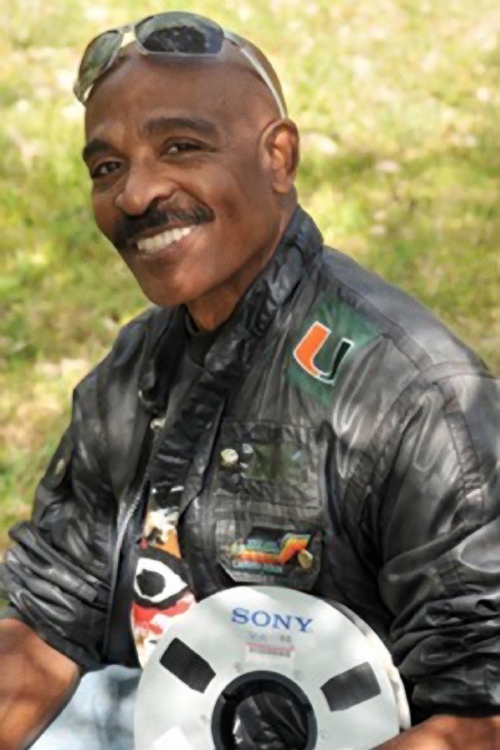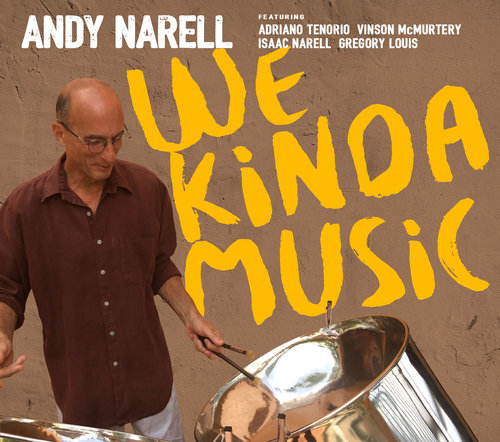

AND I’M ENJOYING THE HELL OUT OF THIS...
Dalton Narine
On US National Public Radio (NPR), Andy Narell describes how pan has taken him from the traditional steel band sound to jazz and back again.
Narell has a sincere and deep conviction about the music he makes. In spite of his fame, he remains thoroughly unpretentious, pooh-poohing the idea that his score of albums bursts out to a paean of his pan and jazz music of his life stories.
Life stories?
Narell claims that he’s simply doing his work, writing complicated forms and creating larger ones, each album, each piece of music that way and experimenting with different others.
Narell insists that there’s nothing about his life in the whole kit and caboodle here.
Yet Narell tells stories. We glean that much from his stellar collection of CD titles and Web videos. In a sense, Narell is no different from any other artist. His work has become his lifestyle.

His latest, We Kinda Music, is a tour de force of a performance that is as eminently enjoyable as it is wildly experimental.
I’m mindful of the fact that, as a fan of classical music, I deeply embrace a work like Symphony fantastique, a self-portrait of French composer Hector Berlioz, who fashioned the music as a drama of his life. He was only 26.
Which is not to compare Narell’s music of his ‘life stories’ to Berlioz’s opus, despite the fact that the plot points of his career as a musician and panist shape him into who he is, how he became himself and, with We kinda Music, who he is on the way to becoming.
Many a Narell album tends to stick in your ear, what with the signature voice, stylish art and distinctive mannerisms of its creator. Since he was seven years old, Narell has devoted his life to pan. America fell in love with him back in 1963 when he showcased his band, The Steel Bandits, on television. He shared with the audience, both in the studio and those ogling him on TV, Trinidad & Tobago’s twin personalities, calypso and pan. This relatively new culture, including jazz, portended a point when The Percussive Arts Society (PAS) Hall of Fame, established in 1972, would induct Narell in its upcoming class of 2017. The Percussion Arts Society, PAS is an international organization with thousands of members.
Steel Bandits
Narell will join artistes such as Art Blakey, Jimmy Cobb, Billy Cobham, Tito Puente, Milt Jackson, Buddy Rich, Lionel Hampton, Gary Burton and Max Roach in the prestigious society.
And he’ll be quite at home with Trini inductees Dr. Elliott "Ellie" Mannette (2003) and Dr. Clifford Alexis (2013).
“It’s overwhelming when I look at who’s there,” Narell reflects for a moment. “So many of my idols.”
It seems appropriate, then, to focus on We Kinda Music, given that PAS recognizes the contributions of the most highly regarded professional leaders in percussion performance, education, research, scholarship, administration, composition and the industry.
And that inductees demonstrate the highest ideals and professional integrity to their profession to bring about significant events, substantive improvements in the world of percussion, and the betterment of the profession through exemplary services or acts.
Indeed, in telling the story of how you became who you are, and of who you are on your way to becoming, the story itself becomes a part of who you are.
Three pieces on the album were introduced in the 2014-16 Panoramas: We Kinda Music, Pan Magic and Dis 1.4. Raf.
None is recycled.
Narell rebuilds these songs from the base upward so we could dance. Sometimes you get the feeling of the rush of blood to the head. It’s as if he’s made little corrections like someone restoring a painting. What can we make better? You’re so into it you don’t really hear the percussion. One is left to wonder if he had more technical ability, what a menace to the society of music he would be. But he already has that cachet.
That Narell is in touch with his inner child brings a tad more craziness, in a good way. It’s exciting, his choreography of the hand—and mind.
Sometimes, artistes need to be truthful to the heart by taking the work above the top.
The first cut delivers We Kinda Music, and it leans toward us as a tree is swayed by the wind. No matter the style of his musical fantasy genre, Narell brings it a whole new resurgence of experience and vision. A whole new area of creativity and drama. A stylish range of jewelry, really.
Abacoco reflects on Ambakoko beach in Laborie, St. Lucia, where Narell and Anita Bonan call home, aside from their Parisian digs. [Note: Bonan, his extremely resourceful panist wife and videographer, was part of the group at Calypsociation, Narell’s laboratory for working out the music for his albums.]
Abacoco lands as music on a quiet song. Hear Isaac Narell’s embellishment on tenor sax; how it accentuates the architectural features of a tune that warbles.
Like the assortment of birds trilling in the opening stanza of Jungle Music.
This work establishes the beauty of the wild, all the while pleasuring or piquing your interest in what Narell is up to. Then flying off into a poem of sorts with the sound of a ping pong at birth. Such a nice touch here.
Featuring Great Animal Orchestra, and Jesus Diaz on conga and per-cussion, Jungle Music relaxes the soul, leaving you to ponder on the magic of it all, as in, How did we get here?
Narell doesn’t miss a beat, you can tell.
Pan Magic could be a tribute to calypsonian Lord Kitchener, but it could be all about Narell’s and Kitchener’s inimitable styles.
Walk back to Coffee Street or dig up the Songlines, an atmospheric and self-analyzing fave that an aficionado hopes to take to his grave.
Pan magic means all that and more.
In a different age, Pan Magic would tell the story about Kitchener and Renegades’ arranger Jit Samaroo. When he was told that Samaroo had accumulated Panorama victories with his calypsos, Kitchener was shocked. “I never met the man,” he told this writer. “I don’t know who he is, but I’ll continue making songs just for him because he likes my music.”
In the age of Narell, Kitchener might have mused silently about the American Caribbean man.
“I don’t need to write for the gentleman. His magic speaks for itself—and himself.”
Speaking of which, Etude for Ellie (Elliott “Ellie” Mannette) is a sampled triple guitar played on a keyboard. There are no overdubs. To play it live on triple guitar, Narell would’ve required six or more arms.
étude in classical music is a short composition for a solo instrument, especially one designed as an exercise, or exploiting technical virtuosity.
Right up Narell’s alley.
“Triple guitar is Ellie’s favorite instrument to play,” Narell says. “What’s amazing is that, at 89, he’s still practicing and improving. He’s the only person I know who uses that instrument to play solo pieces, accompanying himself the way the rest of us (Narell himself, Robert Greenidge, Boogsie Sharpe and Ray Holman) do on the double second.”
When Mannette heard the first version of the etude, he fell on the floor.
“I couldn’t believe what one pan was capable of doing with this new tool,” Narell recalls. “So it was logical to dedicate this song to him (Mannette).”
Other sampled pans on the album includes Jungle Music, notwithstanding a relic of a tenor pan taking you back in time.
Sampled instruments can be combined in various ways. For example, a section of tenor pans, a section of bass pans, and so on. Even an entire steel band.
[Below is the demo of another version of ‘Etude for Ellie.’ It features a whole steel band played live on piano.]
“Actually, there’s a story here,” Narell lets on, “but not the one you think. I’m working on a project with Ellie and Darren Dyke (one of the tuners he’s trained). We are sampling the whole steel band, one note at a time, to create virtual instruments of Ellie’s instruments.
“It’s a project we’ve been working on for a couple of years and it’s almost ready to be released as a product.
“In order to create a virtual instrument, first I record every note on the pan at every possible volume. On average that’s about 35 versions of each note. Each recording of each note is called a ‘sample.’
“So a complete instrument (three octaves, for example, for a double second) will consist of more than 1000 samples. We edit the samples so they all have the same attack, and create a list from softest to loudest, then load it into a Kontakt Player. From there I make adjustments, note by note, to create a balanced instrument.
“Then I can play it on a midi keyboard, like my Yamaha digital piano.”
It must be in his DNA, Narell’s experiments. After all, he’s a chip off the forefathers’ block. Inventors Neville Jules, Elliott “Ellie” Mannette, Anthony Williams, Bertie Marshall and such others having paved the way.
Ah, pan, wondrous pan. We kinda music.
NOTES:
Narell recorded and mixed ‘We Kinda Music’ in France and St. Lucia.
Steel pans created by Dr. Elliott “Ellie” Mannette
Tuners - Ellie Mannette, Glenn Rowsey and Darren Dyke.
CD available at andynarell.com

Dalton Narine watched a movie among friends and was harassed for watching the credits roll. He was 12. They laughed at his quip that someday his name would be scrolling like that on a movie screen somewhere. Little did they know it was a prescient warning.
A similar scene played when Narine stopped learning the piano and walked into a panyard. Nobody believed him until they saw him playing classical music on pan on J’Ouvert. Eventually Narine co-founded the iconic PAN magazine and became senior editor.
Narine, an award-winning writer for two newspapers and a magazine, started working on a novel. But the chair of Columbia University film school steered him toward a screenplay instead. Your story is a movie, the professor said. Today Narine is working on his final draft, with two more screenplays in his head.
contact Dalton Narine at: narain67@gmail.com

 When
Steel Talks shirts
When
Steel Talks shirts